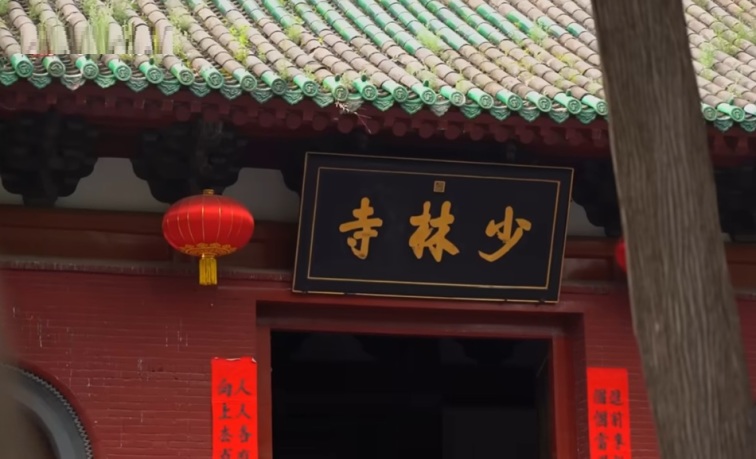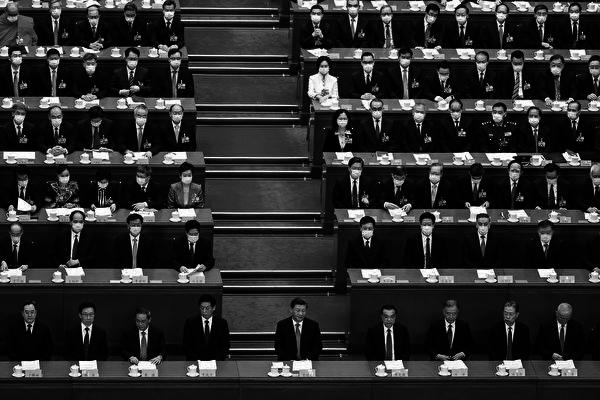On March 5, 2023, Chinese Premier Li Keqiang (right) walked past Chinese President Xi Jinping after delivering the government work report during the opening session of the National People's Congress (NPC) at the Great Hall of the People in Beijing. (Photo by Noel Celis/AFP via Getty Images)
[People News] Shanghai entrepreneur Mr. Hu Liren has collected precious manuscripts and letters written by the late former Premier Li Keqiang during his lifetime, and has been releasing them on his personal media channel. On August 8, he disclosed yet another Li Keqiang manuscript—this one documenting Li’s worries and personal resistance surrounding Xi Jinping’s constitutional amendment, as well as a private conversation between the two men on the matter.
The letter was written in December 2018, in the West Compound of Zhongnanhai, and was addressed “to the future people of China.”
Li Keqiang began: “2018 was a year of heavy and fateful change for China, and the most painful period of my political career.”
In 2018, Xi Jinping amended the constitution to abolish the term limit for the state presidency, sparking massive controversy. This move was seen as overturning key political arrangements set in place by Deng Xiaoping in the 1980s and 1990s, including the system of collective leadership and regular, orderly transfers of power.
Li revealed that in the week before the January 12, 2018, Politburo meeting, security and guard presence in Zhongnanhai was greatly increased, with access routes tightly sealed. Vice-ministerial-level officials and above were summoned one by one by the Central Commission for Discipline Inspection—not for “communication” as claimed, but to exert pressure. Everyone was required to firmly adopt the “correct political stance,” unify their thinking, and express unequivocal support for the upcoming constitutional amendment.
From January 18–19, 2018, the CCP’s 2nd Plenum of the 19th Central Committee approved the “Proposal of the CCP Central Committee on Amending Certain Provisions of the Constitution”. For the first time, it was announced publicly that “Xi Jinping Thought on Socialism with Chinese Characteristics for a New Era” would be written into the constitution.
On February 25, Xinhua News Agency officially published the proposal.
On March 11 in the afternoon, at the 3rd plenary session of the National People’s Congress, the draft constitutional amendment was passed by vote.
Li wrote: “In the face of this change, the entire bureaucracy fell into collective silence. For countless mid- and high-level officials, self-preservation became the only survival logic.”
Li said he refused to remain silent—he wanted to leave a true record so that future generations would know: not everyone was silent, and not everyone was willing to place the nation’s fate into the hands of one man.
In fact, after the Xinhua announcement, many Chinese social media users expressed opposition, openly or obliquely. An article titled “Why I Want to Be Emperor – An Interview with Yuan Shikai” spread widely on WeChat Moments before being swiftly deleted. Weibo quickly activated censorship measures, with numerous accounts banned or deleted. On Baidu Index, between Xinhua’s announcement at around 3 p.m. and 7 p.m. that day, searches for the word “emigration” surged from under 100 to nearly 2,500.
Li recalled that in late 2017, Xi Jinping invited him to a private talk in the West Building reception room of Zhongnanhai.
Xi opened directly: “We are preparing to amend the constitution to abolish the term limit for the state presidency. For the country to be stable and strong, it must rely on centralised leadership.”
Li said his heart jolted—he immediately recognised this as a major deviation from the proper institutional path, posing a serious threat to the country’s future.
Xi went on, saying the Party and the country were in a critical transitional stage, and the core leadership could not be easily replaced. This was for the sake of “long-term stability.”
Li replied: “General Secretary, the reform is not yet complete. Amending the constitution now will not only cause unease inside and outside the system, but will also seriously damage our image and credibility in the international community.”
Xi responded: “This is not a matter you can influence personally—it is a decision made after unified consideration by the Party Central Committee. The overall situation is set; no opposition will be tolerated.”
Li insisted, “General Secretary, we cannot replace institutional constraints with personal will. Power must be regulated—this has always been the direction of our reforms.”
After a pause, Xi said, “History will prove our decision is correct.”
The meeting ended abruptly.
Li wrote: “The atmosphere in that meeting was tense, with no meeting of minds. He spoke of centralised leadership; I spoke of institutional systems. He spoke of historical mission; I spoke of national trust.” Li sensed Xi’s words carried a warning for him and knew that his opposition to the amendment would bring consequences.
Afterwards, Li initiated a risk assessment mechanism within the State Council system and tried to contact principled legal scholars inside the system to issue a joint statement. But he quickly realised his persuasion had failed.
Li believed this amendment was a profound betrayal of the spirit of the Constitution, institutional principles, and the people’s will. It was not an isolated incident, but part of a systemic shock that would have far-reaching consequences for China’s politics, economy, finance, society, and foreign relations.
Li emphasised that he was not writing this to defend himself, but in the hope that one day China could return to the correct institutional path—where people have the power to choose, the freedom to speak, and a life protected by the rule of law.
In closing, Li wrote: “I tried my best, though I did not succeed—but I have never given up. The nation does not belong to any one person. It belongs to the people, to the law, and to the future.”
Hu Liren remarked that today’s China has moved in exactly the direction Li most feared back then: institutional breakdown, centralised autocracy, societal anxiety, and a collapse of trust. Li’s letter, he said, had long ago predicted it all with striking accuracy. △











News magazine bootstrap themes!
I like this themes, fast loading and look profesional
Thank you Carlos!
You're welcome!
Please support me with give positive rating!
Yes Sure!